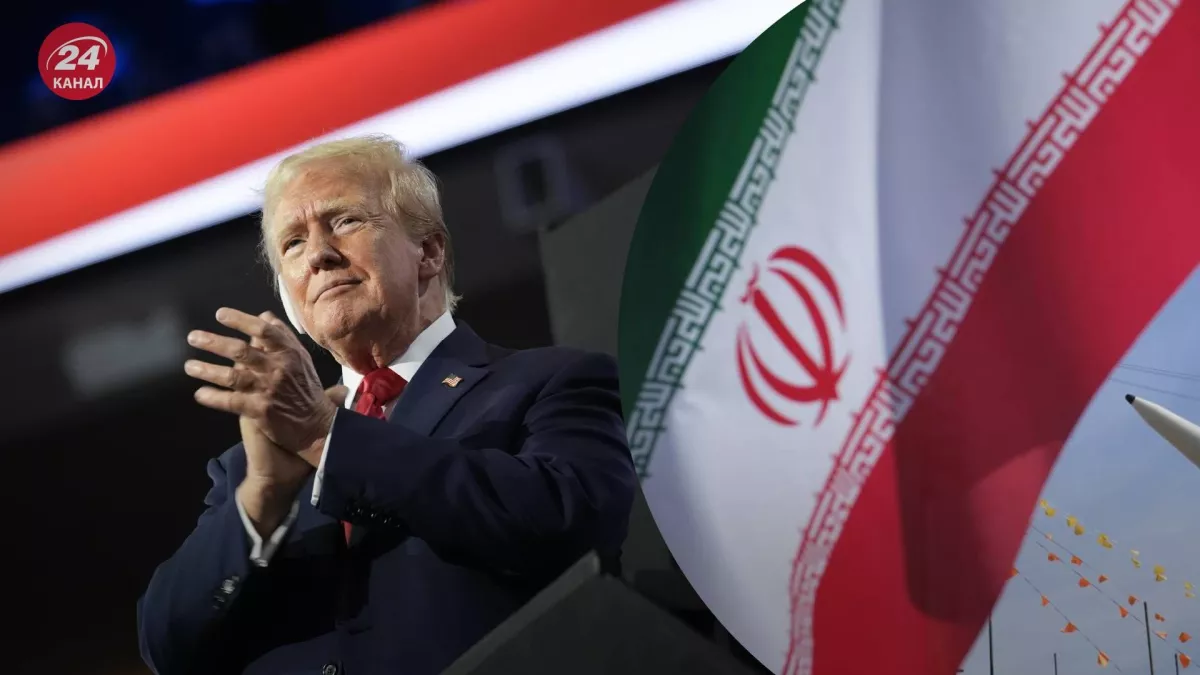Will Trump's strategy bankrupt Iran or lead to a new nuclear deal? Experts weigh in
A future Donald Trump administration is expected to revive the "maximum pressure" policy from his first term in office to "bankrupt" Iran's ability to finance regional proxies and develop nuclear weapons. This was reported by the Financial Times, citing sources familiar with his plans.
"He’s determined to reinstitute a maximum pressure strategy to bankrupt Iran as soon as possible," said, in particular, a national security expert.
At the same time, Trump has hinted during his election campaign that he wants to strike a deal with Iran.
According to sources, the maximum pressure tactic will be used to try to force Iran into negotiations with the United States, although experts believe this is unlikely.
Trump launched the "maximum pressure" campaign during his first term after pulling out of the 2015 nuclear deal signed by Iran with world powers and imposing numerous sanctions on the Islamic Republic. In response, Tehran ramped up its nuclear program and is enriching uranium to levels close to weapon-grade.
According to sources, Trump's transition team is already developing executive orders that he could sign on his first day in the Oval Office targeting Tehran, including measures to tighten and expand sanctions on Iranian oil exports.
“If they really go whole hog…they could knock Iran’s oil exports back to a few hundred thousand barrels per day. It’s their main source of earnings and their economy is already much more fragile than it was back then… they’re in a corner much worse than even the first term, it would be a pretty bad situation” said Bob McNally, president of consultancy Rapidan Energy and a former energy adviser to the George W. Bush administration.

Trump's advisers have urged the new president to act quickly regarding Tehran, with one person familiar with the plan stating that the new US leader will make it clear, "that we are going to treat Iran sanctions enforcement very seriously."
The maximum pressure campaign is aimed at depriving Iran of revenue to build its military or finance proxy groups in the Middle East region, but ultimately, it comes down to forcing Tehran to negotiate a new nuclear deal and change its regional policies, sources emphasized.
"We’re hoping that it will be an incentive to get them to agree to negotiations in good faith that would stabilise relations and even someday normalise them, but I think Trump’s terms for that will be much tougher than the Iranians are ready for," said a national security expert.
Meanwhile, Iran's Foreign Minister Abbas Araghchi urged Trump's team to stop attempting to apply maximum pressure.
"Attempting 'Maximum Pressure 2.0' will only result in 'Maximum Defeat 2.0'. Better idea: try 'Maximum Wisdom'—for the benefit of all," he wrote on social media platform X, hinting at Iran's nuclear advancements since Trump pulled out of the deal.
So, do Trump’s team have a chance of bankrupting Iran with their actions and forcing it to agree to restrict its nuclear activities? Or is it not so simple, and can Iran find ways to circumvent such pressure?
This is the question experts on Iran shared their opinions about with Caliber.Az.

Iranian political analyst and expert on Russian-Iranian relations Amir Mohammadi Chahaki believes it is important to keep in mind that when Trump first took office in 2016, he lacked political experience and had not previously served in Congress or the Senate.
"But in January, a different Trump will enter the White House. He is now wiser, more experienced, and has the bitter experience of determining America's allies. During his first term, he didn’t have a tested team; all the people were new to him. Back then, he often said that businessmen make good politicians, that the head of state should be a merchant. And in the first year, he made many changes in his team, which was unprecedented in US presidential history.
At that time, he waited for negotiations with Iran — Trump didn’t immediately pull out of the nuclear deal. In my view, back then the Islamic Republic of Iran missed a very good opportunity for itself — it didn’t want to engage with Trump because Ayatollah Khamenei had forbidden direct negotiations with America. But a lot of time has passed since then.
During his current presidential campaign, Trump has clearly stated his position on Iran several times. He said that he does not want regime change in the Islamic Republic of Iran (IRI), nor does he want a war with the country. He pointed out that the US has plenty of its own problems and questioned why it should get involved in distant foreign matters. He also made it clear that during his first term, he did not want the Iranians to have a nuclear bomb, and that they should live happily without one and remain strong," the expert recalled.
The analyst believes that Trump will insist on a new deal.
"He will not agree to restore the old 'nuclear deal'; America will try to strike a new agreement with Iran. And I don’t think Trump intends to give the Europeans much leverage in this matter either. He will try to negotiate directly with Tehran.
What will the essence of these negotiations be? It will be about minimizing uranium enrichment, depriving Iran of uranium that could be used for military purposes, ensuring that Iran never gains the ability to become a nuclear power.
Another demand will concern limiting the range of missiles being developed in Iran. Specifically, to prevent the creation of missiles with a range greater than 2,000 km — a capability that the IRI already possesses. And, of course, there will be a demand for Tehran to stop supporting proxy groups. The US has always been concerned with Israel's security, ensuring that Hamas and Hezbollah do not take action against it.
And I think this time Trump will be more flexible. Moreover, he has the tool of imposing harsher sanctions that would prevent Iran from selling its oil. It's impossible to come up with new sanctions, as all other Western restrictions against Iran have already been implemented. I believe Trump will insist on China adhering to anti-Iranian sanctions. And China will go along with this if Iran continues its ambiguous confrontation with the US.
I believe Tehran is ready for talks with Washington, and the facts show this. Both President Pezeshkian and Foreign Minister Araghchi have indicated this," Chahaki expressed hope.

In turn, Israeli Iran specialist and journalist Michael Borodkin believes that the task facing the Trump administration will indeed be challenging.
"Western countries, through their actions—or rather, their inaction regarding Ukraine—have convinced their adversaries, including Iran, that the only firm guarantee of sovereignty and non-interference from the West is nuclear weapons. The Iranian regime understood this back in 2014 during the annexation of Crimea, but the current war has provided additional confirmation. When Western representatives say they would have willingly defended Ukraine if Russia did not possess nuclear weapons, it explains everything. Therefore, the current Iranian regime will not give up its military nuclear program. There may only be a temporary halt or slowdown in its development," the Iran expert believes.
According to him, the US has several tools at its disposal that could exert significant pressure on Iran.
"This is a total ban on any purchase of Iranian energy resources, with strict measures against those who violate this ban. But does the US have the political will to implement these tools? I’m not sure. China quietly buys Russian oil, providing Moscow with the funds to continue the war. Moreover, India, which is one of America's allies, does the same. The situation with Iranian oil is no different. While Trump might still try to impose secondary sanctions on China, escalating pressure on India seems highly unlikely.
Trump may decide to take measures to change the regime in Iran, but such an operation—if it does not involve direct invasion, which the elected president has often said he won’t engage in—would be fraught with organizational difficulties and high costs.
So, the US could intensify pressure on the Iranian economy, but not in a way that would provoke internal unrest. This means the Iranian regime will again begin dragging out negotiations. To force them to make concessions, strong political will and a direct threat of the use of force are needed. Whether Trump can handle this task will only be revealed with time," concludes Borodkin.








